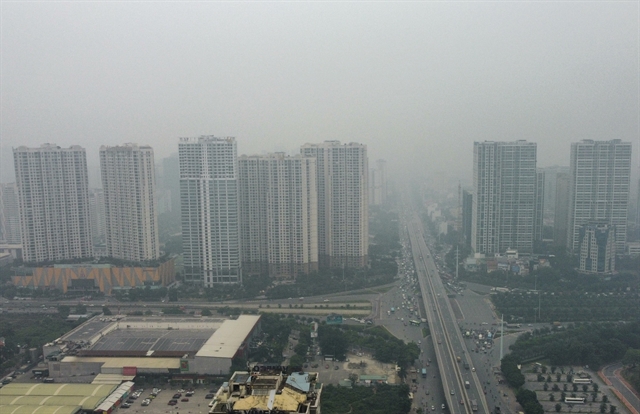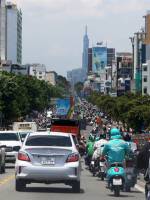
The Ministry of Agriculture and Environment has announced that it will deploy unmanned aerial vehicles and satellite imagery to monitor and detect major sources of emissions contributing to environmental pollution in the next few months.
The ministry will forward images of violations to local authorities, asking provincial and municipal People’s Committees to take immediate action after receiving the reports.
This is part of a series of urgent measures introduced in response to severe air pollution forecast for late November and early December in Hà Nội and surrounding provinces.
In an official dispatch sent to leaders of Hà Nội, Hải Phòng, Bắc Ninh, Hưng Yên, Phú Thọ and Ninh Bình, the ministry cited data from the national environmental monitoring system and meteorological forecasts indicating that over the next 10 days, northern localities — especially Hà Nội and nearby provinces — will experience unfavourable weather conditions such as temperature inversion, low wind and fog.
These conditions reduce the dispersion of air pollutants, increasing the risk of fine particulate matter (PM2.5) accumulation. According to forecasts, the Air Quality Index (AQI) is expected to exceed 150, directly affecting economic activities, social life and public health.
The ministry urged provincial and municipal authorities to strengthen street cleaning efforts and implement measures to reduce road dust. Environmental sanitation units and contractors for transport infrastructure projects have been instructed to increase road sweeping and vacuuming, and to operate specialised water-spraying vehicles along major roads and urban gateways.
Water spraying and dust suppression should be prioritised during off-peak hours at night and early morning before 6am to reduce dust accumulation before traffic peaks and to avoid congestion.
Authorities must also tighten control over construction activities and transportation, both of which generate dust. Local departments of construction, police forces and authorities have been asked to intensify inspections of construction sites, strictly enforce requirements on site coverings and ensure vehicles entering and leaving sites are cleaned.
Construction activities may be suspended if environmental regulations are not met, particularly when they cause dust pollution or allow mud and debris to spread onto public roads. Violations involving uncovered trucks carrying construction materials or waste must be addressed.
Industrial emission sources and craft villages with processes that involve burning will also be placed under stricter supervision. Localities are instructed to review and inspect compliance with environmental regulations at industrial facilities, especially high-emission sectors such as cement, thermal power and steel production, and at craft villages with recycling or burning activities.
Communal and ward authorities must reinforce on-the-ground management. Local police forces will take the lead, coordinating with relevant agencies to patrol, detect and strictly penalise the illegal burning of household waste, straw and agricultural by-products, particularly in border areas and near major intersections.
The ministry has also stressed the need to strengthen public communication and health alerts. Local departments of agriculture and environment and departments of health are to work with media outlets to provide continuous updates on air quality and encourage residents to monitor the VN AQI index via the VNAir app.
Public advisories should remind citizens, especially the elderly, children and those with respiratory conditions, to limit outdoor activities, avoid exercising outdoors in the early morning and late evening, and wear masks when air quality is poor.
If necessary, the ministry will work with localities to establish inter-sectoral task forces to inspect and supervise the implementation of these measures. Violations will be strictly handled, and information about offending organisations and individuals will be publicly disclosed.
(VNS)




